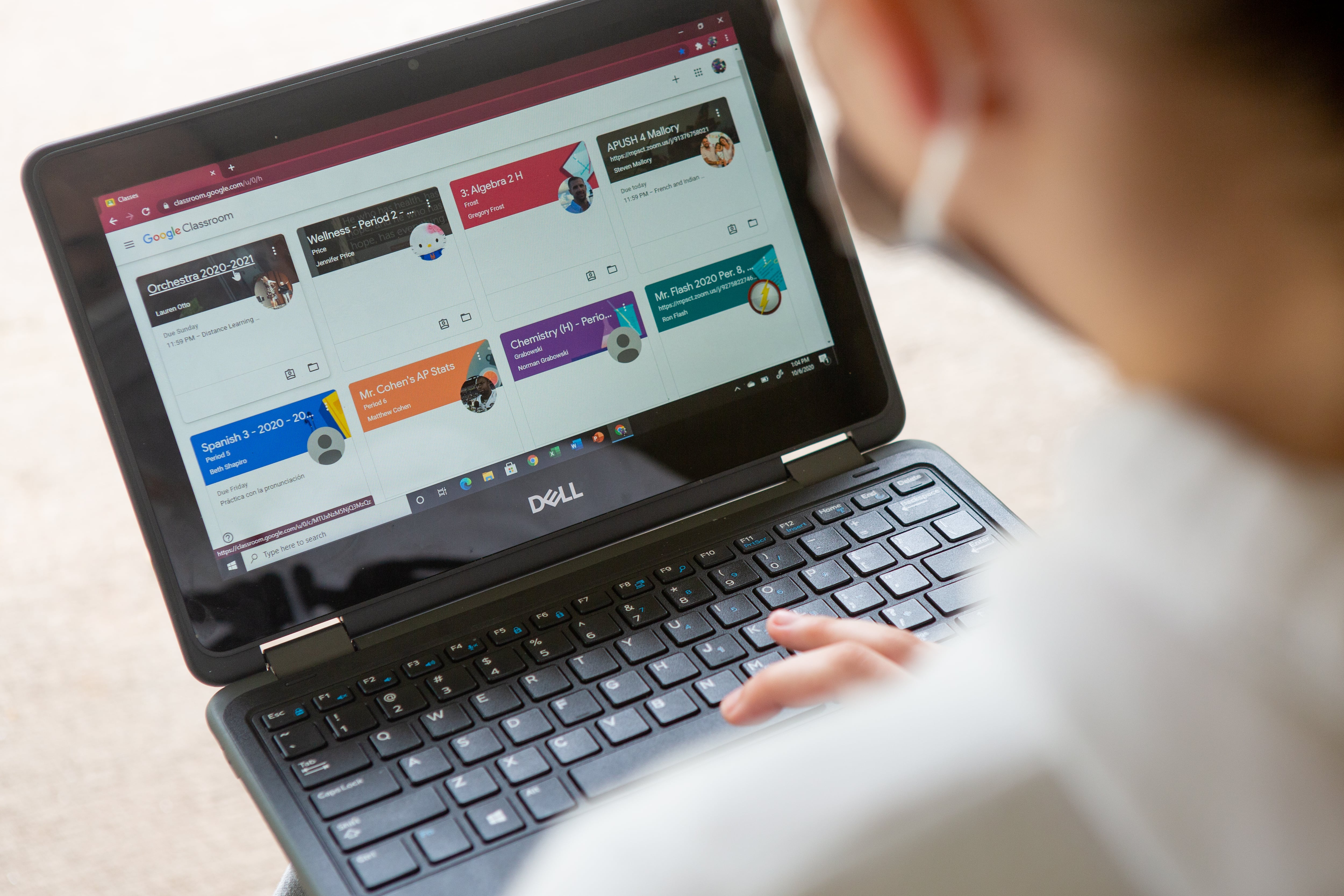Chicago parent Debora was caught off guard last week when she received the first of two phone calls connected to the district’s new Virtual Academy.
The district needed to know if she wanted to enroll her daughter in an online classroom this fall, the caller said, assuring Debora with a scripted speech that her daughter was “on the list” of students to contact.
But while the CPS sophomore has a laundry list of medical accommodations, she doesn’t qualify for the Virtual Academy — nor does she want to attend.
A lot of families are clamoring for a remote learning option, Debora, who asked Chalkbeat to withhold her last name and her daughter’s school name out of privacy concerns, told the caller. Why aren’t you offering the Virtual Academy to them?
The caller couldn’t answer that question, but doubled back later to let Debora know the district was reviewing other Virtual Academy applications on a case-by-case basis.
Debora still doesn’t know how her daughter got on that list, or what the district’s policies are to organize the Virtual Academy’s incoming class.
“This is not how you execute a project,” Debora said. “It all looks confusing and chaotic … how can parents possibly make decisions?”
Chicago Public Schools will offer a limited Virtual Academy for students with specific medical needs this fall, but so far plans are fuzzy, signups are tepid, and parents have been left pressing each other for details. District spokespeople say they can’t provide information about the Virtual Academy until more students have enrolled, but parents say they won’t enroll their children until they feel more familiar with the online school’s design.
Still others are locked out of the process of applying for the Virtual Academy entirely, leaving them to look for more creative alternatives as the delta variant causes a spike in cases.
As of early last week, only 150 students — out of 3,000 the district determined to be eligible — had applied for the Virtual Academy, and the district was only anticipating a few hundred more applications, a spokesperson told the Chicago Tribune. Chalkbeat asked Chicago Public Schools for more updated figures, but the district did not provide them by publication time. The deadline for applying was Aug. 6.
A spokesman said the district was following state and federal guidelines with its planned full-time reopening. “Health officials, scientists and officials at the Chicago Department of Public Health also agree that opening schools in the fall is not only in the best interest of our students, but that it can be done safely, which is why there will not be a standing virtual learning option except for our most medically fragile students who meet specific criteria.”
Across the country, school districts are grappling with whether to provide remote options to families and what restrictions to put on them. While stressing the need to fully open schools, the Illinois board of education has said that school districts in the state must offer a remote learning option for students who are not eligible for vaccines and under quarantine orders, but hasn’t offered many more specifics.
CPS teachers will staff Chicago’s Virtual Academy, which will only serve medically fragile students next year as their peers resume in-person learning. To be eligible for this year’s academy, students needed to show they have a medical condition on one of two lists: students who fall into the first group, which includes certain cancers and cystic fibrosis, have automatic admission into the Virtual Academy, while students in the second group, which includes asthma and diabetes, are only eligible if their attendance last year was below 75%. According to school board documents, the district will likely expand and continue running the Virtual Academy in coming years.
While some parents such as Debora feel wary of the plan that’s on the table, others pleading for a remote option say they’ve been stonewalled by the district, and they feel hopeless and scared for the year to come.
Some parents of students who qualify say they won’t enroll because they know next to nothing about how the district’s Virtual Academy operates, and they’ve been left out of the planning process. Among their questions: What will the curriculum look like? How will the academy engage students with IEPs? If a student or family has a change of heart, can the student re-enroll in a brick-and-mortar school? What if a student can’t enroll in the Virtual Academy, but they have a family member with a serious medical condition?
With 20 full days left on the clock until students return to classrooms, parents are pressing the district for answers. Many push for a remote option open to more students. A few are wondering whether they should pull their students from CPS altogether, a problematic prospect for a district already facing sharp enrollment declines.
District leaders say a return to in-person learning is essential to address pandemic learning loss. They’re bound by a state board of education resolution passed in May, which requires school districts to reopen school buildings with few exceptions. Funding is also part of the picture. This year’s CPS budget draws on more than $1 billion in federal stimulus money the Biden administration has repeatedly stressed should be used to reopen classes in the fall.
For some families, however, a return to in-person learning roils fears about the safety of their children.
Crystal Lam’s daughter, a first-grader at James Ward Elementary School, doesn’t have an underlying medical condition that would qualify her for the Virtual Academy, but the six-year-old does have severe allergies, which means she needs to take off her mask to blow her nose constantly.
With delta variant infection numbers shooting up, every part of the in-person school day feels concerning to Lam. Six-year-olds bump into each other all the time. They need hands-on help with projects. They need to unmask for lunch. What, she wonders, would that mean for viral transmission among an entirely unvaccinated age bracket?
“There are just so many questions in my mind,” Lam said. “And the closer [the reopening] comes, the more dread I feel in my stomach.”
She’s tempted to pull her children out of the district and homeschool them instead. But she’s worried her daughter would lose her seat at James Ward. The district guarantees students enrolled in the Virtual Academy will have their seats saved until they return to the classroom, but the same promise doesn’t apply to families who take a break from the district.
Meanwhile, some parents of students who qualify for the Virtual Academy say they won’t enroll because the program doesn’t support their child’s medical needs.
Nicole Abreu, a CPS parent who is also on the board of parent advocacy group Raise Your Hand, said she won’t enroll her daughter, who has epilepsy and rare neurological conditions, in the Virtual Academy. Her daughter’s health oscillates between stability and emergencies, which can take her out of school for weeks at a time. Abreu wants her daughter to learn in-person in fourth grade at Friedrich L. Jahn Elementary School, but she’s not sure whether a medical crisis could jeopardize her attendance, and the district’s all-in or all-out policy for enrolling in the Virtual Academy doesn’t give her flexibility.
“That’s the whole point of medically fragile kids,” Abreu said. “A lot of them have complicated conditions that are very individualized and very unpredictable in some cases.”
When Abreu raised that point to a district official who asked her to enroll in the program, she was told decisions would be made on a case-by-case basis.”
Brenna O’Brien, a CPS parent to a second-grader and a fourth-grader who has an IEP, says the Virtual Academy is a “black box” with little to no transparency — and that uncertainty is especially pronounced for students with IEPs. Those students often work with teams of staff members and lean on strong relationships they’ve built over time. She’s concerned the Virtual Academy will knock relationships and structure out of the school day for some diverse learners. Nothing she has heard from the district has assured her otherwise.
O’Brien is organizing with a group of parents to call for a more accessible remote option through the first quarter, or until all students are eligible to be vaccinated.
“It is so confusing and frustrating, but I refuse to unenroll because public education is a public right,” O’Brien said. “As soon as parents leave the system, they have no voice anymore.”
In the meantime, she refreshes the district’s website every morning, scouring for more details, an update — anything.
Each time, she is met with the same Fall 2020 reopening plan and a message: “Check back soon for new information.”
Clarification: The story was updated to reflect that Illinois districts must provide remote learning options under a strict set of circumstances.
This story was updated to include a new statement from a Chicago Public Schools spokesperson.







